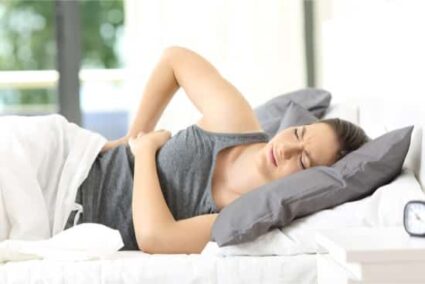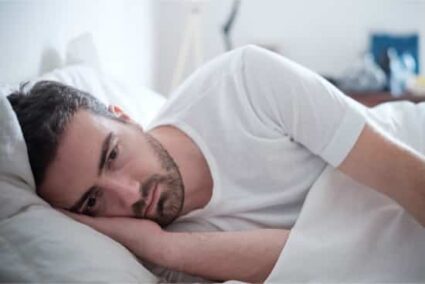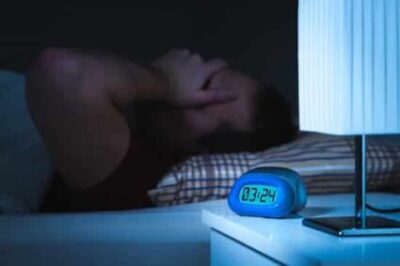It seems like bed bugs will bite while you sleep no matter what you do. But, by using several effective anti-bed bug tools, you can stop them from biting and sleep in your bed at night.
Use a potent bed bug spray to eliminate any parasites hiding under the mattress, in the headboard, and box springs. This will kill bed bugs on contact. Then use a mattress encasement to keep bed bugs trapped inside where they can’t bite you. Placing traps around the feet of your bed will stop bed bugs from reaching you.
When combined, sprays, traps, and encasements mean that you can sleep in a bed without getting bitten by bed bugs. Kill all visible bed bugs and keep the remainder away from you at night.
Why is Sleeping in a Bed with Bed Bugs So Difficult?
You may or may not see bed bugs when you go to bed. They are still there if you can’t see them, they’re just hiding away. You will likely find it difficult to sleep due to anxiety. Bed bugs affect human health in a variety of different ways that go far beyond the physical.
When you do get to sleep, the bed bugs won’t bite at first. They wait until the early hours of the morning, when you’ll be in your deepest sleep.
They will then come out one by one to feed. They follow your scent and the warmth you give off. There’s nothing you can change to prevent them from being able to find you. They will then feed for fifteen or twenty minutes each. Once finished, they head back to their harborage.
Do Bed Bugs Disturb Sleep?
Bed bugs bite during the early hours, between 3 am and 5 am. This is an innate behavior that was shaped by evolution. There are several reasons why they pick this time:
- They dislike sunlight. These hours are the darkest, which is when they’re the most comfortable
- This is usually the time when you’re in stages three and four of the sleep cycle. During earlier stages, you will wake up in response to stimuli. In these later stages, noises and feelings won’t wake you.
- Because it’s so late, if you do wake up, it’s dark. The cover of darkness is best for bed bugs as you can’t see them.
This means that bed bugs don’t disturb your sleep. Even when you’re awake, the feeling of a bed bug biting you isn’t very painful or sharp. When you’re in a deep sleep your body doesn’t send such a small signal to your brain. It, therefore, won’t wake you or disturb you.
However, this depends on the size of the infestation. If the infestation is large, then they may feed throughout the night. If this is the case, they will disturb your sleep soon after you go to bed, and just before you wake up in the morning.
They are also more likely to disturb you if you have an abnormal sleeping pattern. If you go to sleep late, for example, past midnight. They would be feeding reasonably early in your sleep cycle, again disturbing you.

Mental Health Effects of Bed Bugs
Their bites don’t wake you, but their presence will. People don’t appreciate that bed bugs affect mental health. This effect can keep you awake, among other things.
A paper in BMJ Open looked at this topic. A group of researchers looked at almost 100 tenants in an apartment block in Montreal. Some had bed bugs, some didn’t, and the researchers wanted to look at what difference they made.
They found that people with bed bug infestations were more likely to experience anxiety and, perhaps, depression. These two conditions can both cause sleep disturbances.
Anxiety and depression won’t disappear overnight after bed bug treatment. However, knowing that the mattress underneath you is full of bed bugs will exacerbate both problems. In that way, even though their bites won’t keep you awake, their other effects will.
Should You Sleep on the Couch Due to Bed Bugs?
Even if you’re scared to sleep because of bed bugs, you shouldn’t sleep on the couch. If you do, you will bring the bed bugs with you. They will then infest your couch and living room furniture.
When the time comes to get rid of them, this makes it harder. The more places that the bed bugs set up harborages, the more difficult it is to find them all. It also becomes difficult to kill them as they find lots of cracks to hide in.
You still shouldn’t sleep on the couch even if you’re being bitten badly. If you did sleep somewhere else, you would get one or two nights of few bites. But the bed bugs would quickly follow you.
Rather than trying to find some respite on the couch, address the situation.
How to Stop Bed Bugs from Biting While You Sleep
Bed bugs are naturally attracted to people. That’s how they find new hosts and new harborages. They are attracted to the heat and scent you give off, as well as carbon dioxide. You breathe out carbon dioxide when you breathe.
There is nothing you can do to prevent a bed bug from noticing these lures. Keeping yourself cool at night won’t cool you down enough. You can’t stop breathing out CO2. And even if you wash and wear perfume, the bed bugs will still notice your smell.
Does Keeping the Light on Stop Bed Bugs?
It’s known that bed bugs don’t like the light. This is true—they’re photophobic. When they’re exposed to light, they run away and try to find somewhere to hide. This natural reaction prevents them from being seen and squashed.
You can test this for yourself. If you know you have bed bugs under your mattress, try lifting the corner. If there are any bed bugs there, they will scurry away from you, trying to find a hiding place.
But does turning on the light keep bed bugs away? While bed bugs don’t like light, their feeding impulse is stronger. They will ‘brave’ the light that you leave on and come and feed anyway.
Do Pajamas Stop Bed Bugs from Biting?
Another idea that people have is to wear pajamas to stop bed bugs from biting. If you wear clothes, then bed bugs won’t be able to access your skin to bite you.
Again, this is true to an extent. Bed bugs don’t like clothing. They can’t bite through clothes, for a start. They also don’t like ‘burrowing’ under clothing to access skin. Pajamas do have some effect.
But pajamas don’t cover your whole body. They only cover most of you. Bed bugs will gravitate towards any open skin, whether that means your feet, hands, and forearms, or even your neck.
Even if you did manage to cover your whole body, they would try to find a way. They could try to get up your sleeve, for example. They prefer finding open skin but will explore to find somewhere to feed if necessary. Pajamas, therefore, don’t work either.

Do Mattress Encasements Stop Bed Bugs from Biting?
Mattress encasements are the best way to stop bed bugs from biting. They are large, zip-up bags that fit tightly around a mattress. The idea is that they prevent any bed bugs from getting in or out. This means two things:
- Bed bugs can’t set up a new infestation in your mattress.
- Any bed bugs or eggs that are on your mattress are trapped inside the encasement.
Encasements aren’t air-tight. They don’t create an environment where the bed bugs can’t breathe. They can live inside without feeding for months, even a year or more in some cases. Bed bugs are natural survivors.
If you use an encasement, you can sleep in a bed with bed bugs in it. But because you stop them from biting, they may as well not be there.
Are Bed Bug Traps Effective?
The mattress isn’t the only place that bed bugs live. They can also live in furniture, in between the baseboard and the wall, or in cracks in floorboards. If you have a large infestation, they will live in even more improbable places.
Because of their possible range, a mattress encasement isn’t enough on its own. It will stop bed bugs in your mattress from biting you. But it won’t stop bed bugs from around the room coming to feed.
That’s where traps come in. Some traps can sit around the feet of your bed. They catch bed bugs as they try to get to you from nearby furniture harborages. They work well in conjunction with an encasement.
Other traps can actively lure bed bugs in. These can sit anywhere in the room. They distract bed bugs and draw them to the trap, rather than allow them to come to you. These can even lure bed bugs out of your mattress.
Can You Sleep in Bed after Bed Bug Treatment?
Alternatively, you could consider bed bug treatment. Pest controllers use either heat treatments or pesticides to kill bed bugs. These treatments kill bed bugs throughout the house, including inside furniture and mattresses.
Is Pesticide from Bed Bug Sprays Harmful?
Pesticides aren’t good for you. Exterminators follow a protocol whereby they open a window or door to allow a breeze in after they spray. This blows out any excess pesticide, which could be harmful if not gotten rid of. You do the same if you use a bed bug bomb, which is a similar thing.
The problem is that one-time exposure isn’t so bad; it’s constant exposure that’s bad for you. If you sleep in a bed that’s been heavily sprayed, this could be bad for your health.
You can have natural bed bug sprays, e.g. those made from essential oils. But these aren’t as effective as commercial sprays. Using pesticide on your bed, and still sleeping there, is a bad idea.
Can You Sleep in Bed after Bed Bug Heat Treatment?
Heat treatment is better than pesticide in this way. You only need to heat treat a house once. If done correctly, it kills every bed bug and every egg.
After heat treatment, there will be no bed bugs or eggs in your bed. There may be some dead ones that you need to clean away. But there’s nothing in there that will bite you.
You can sleep in your bed straight away after heat treatment with no issues. There shouldn’t be any bed bugs in nearby furniture, either. So, if it was done right, heat treatment means you won’t get bitten at all while you sleep at night.


Its been 2 and a half weeks since my first bite, what are the chances of me getting rid of them by myself ? After being bite I found 2 one on each side, they looked to be in the 2nd to 3rd stage of life,I’ve been using bed bug powder, bleach ,alcohol plus others, but I have not came across a single one since then, also I already have mattress covers on so they ain’t in there, can I control this ?